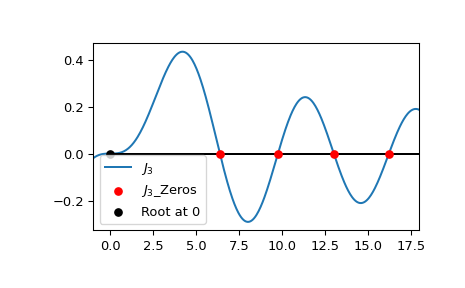scipy.special.
jn_zeros#
- scipy.special.jn_zeros(n, nt)[source]#
Compute zeros of integer-order Bessel functions Jn.
Compute nt zeros of the Bessel functions \(J_n(x)\) on the interval \((0, \infty)\). The zeros are returned in ascending order. Note that this interval excludes the zero at \(x = 0\) that exists for \(n > 0\).
- Parameters:
- nint
Order of Bessel function
- ntint
Number of zeros to return
- Returns:
- ndarray
First nt zeros of the Bessel function.
References
[1]Zhang, Shanjie and Jin, Jianming. “Computation of Special Functions”, John Wiley and Sons, 1996, chapter 5. https://people.sc.fsu.edu/~jburkardt/f77_src/special_functions/special_functions.html
Examples
Compute the first four positive roots of \(J_3\).
>>> from scipy.special import jn_zeros >>> jn_zeros(3, 4) array([ 6.3801619 , 9.76102313, 13.01520072, 16.22346616])
Plot \(J_3\) and its first four positive roots. Note that the root located at 0 is not returned by
jn_zeros.>>> import numpy as np >>> import matplotlib.pyplot as plt >>> from scipy.special import jn, jn_zeros >>> j3_roots = jn_zeros(3, 4) >>> xmax = 18 >>> xmin = -1 >>> x = np.linspace(xmin, xmax, 500) >>> fig, ax = plt.subplots() >>> ax.plot(x, jn(3, x), label=r'$J_3$') >>> ax.scatter(j3_roots, np.zeros((4, )), s=30, c='r', ... label=r"$J_3$_Zeros", zorder=5) >>> ax.scatter(0, 0, s=30, c='k', ... label=r"Root at 0", zorder=5) >>> ax.hlines(0, 0, xmax, color='k') >>> ax.set_xlim(xmin, xmax) >>> plt.legend() >>> plt.show()
